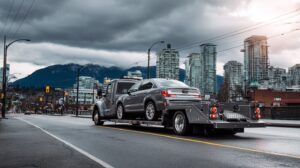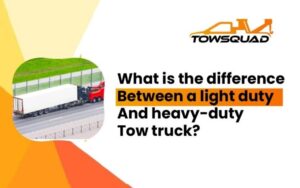When your heavy-duty vehicle breaks down, waiting for towing services can be stressful and dangerous. Knowing how to stay safe while you wait is crucial for your well-being and the safety of others. Here are essential safety tips to follow while waiting for heavy-duty towing services.
Move Your Vehicle to a Safe Location
If possible, move your vehicle out of traffic and onto the shoulder of the road. This minimizes the risk of further accidents and allows traffic to flow smoothly. If you’re unable to move the vehicle:
- Turn on your hazard lights to alert other drivers.
- Set up reflective triangles or flares behind your vehicle for added visibility.
Turn Off the Engine and Remain Inside
Once safely parked, turn off the engine to avoid potential fuel leaks or fire hazards. If it’s safe, stay inside your vehicle with seat belts fastened. Your car offers protection from other vehicles and the elements, especially on highways or busy roads.
Make Your Presence Visible
Visibility is key to staying safe while waiting for a tow. Use these tips to ensure your vehicle is seen:
- Keep your hazard lights on.
- Use flares, reflective triangles, or road cones if you have them.
- Keep your interior lights on at night to signal to others that your vehicle is stationary.
Avoid Standing Near the Road
Never stand directly behind or beside your vehicle, especially on busy roads. Stay inside if possible or move to a safe location away from traffic. Drivers may not see you, and standing too close to moving vehicles increases your risk of injury.
Call for Professional Help Immediately
Call a reputable heavy-duty towing service once you’re in a safe location. Please provide them with clear details about your situation and location. Share any relevant information such as:
- Your exact location, road markers, or landmarks.
- The nature of the vehicle issue.
- Any traffic conditions that might impact the towing process.
Be Aware of Your Surroundings
While you wait for the towing service, stay alert to your surroundings. Watch for approaching vehicles, pedestrians, or wildlife, and avoid distractions like texting or using your phone excessively.
Keep Essential Emergency Supplies in Your Vehicle
Preparation is key when waiting for heavy-duty towing. Stock your vehicle with the following emergency supplies:
- A first aid kit.
- Flares or reflective gear.
- Warm clothing, blankets, and food in case of a long wait.
- A flashlight with extra batteries.
Communicate with Towing Services for Safety Updates
Stay in contact with the towing company to receive updates about their arrival. If there are delays or changes in the situation, you’ll want to know so you can adjust your safety precautions accordingly.
Stay Calm and Avoid Risky Offers of Help
Strangers may offer assistance while you wait for professional towing services. Politely decline offers of help unless it’s from an official source like roadside assistance. Remaining calm and waiting for a trained professional ensures your vehicle is handled properly and safely.
The next time you’re in a roadside emergency, prioritize your safety while waiting for heavy-duty towing. Always choose professional and reliable services for your towing needs. Contact us today to learn more about our quick and secure heavy-duty towing solutions! Stay safe and prepared on the road.
Conclusion
Staying safe while waiting for heavy-duty towing requires preparation, awareness, and calm decision-making. By following these essential safety tips—such as moving your vehicle to a secure location, staying visible, and calling a trusted towing service—you can ensure your safety and that of others on the road. Remember, having the right supplies on hand and knowing when to stay inside your vehicle are key to handling roadside emergencies effectively. When in doubt, always prioritize professional assistance. Reach out to us today for reliable, fast, and safe heavy-duty towing services!
FAQs
Q1: What should I do if I can’t move my heavy-duty vehicle off the road?
If you can’t move your vehicle, turn on your hazard lights immediately and set up reflective triangles or flares if available. Stay inside your vehicle with your seatbelt fastened and call a professional towing service as soon as possible.
Q2: How can I make my vehicle more visible while waiting for towing services?
To enhance visibility, keep your hazard lights on and use reflective triangles or road flares if you have them. At night, turning on your interior lights can also help signal your presence to other drivers.
Q3: Is it safe to accept help from strangers while waiting for a tow?
While offers of help may be well-intentioned, it’s safest to wait for professional assistance. Politely decline help from strangers unless it’s from an official roadside assistance service or emergency responder.
Q4: What emergency supplies should I keep in my heavy-duty vehicle?
It’s important to have a first aid kit, reflective triangles, a flashlight with extra batteries, warm clothing, blankets, and some food and water. These items will keep you prepared in case of a long wait for towing services.
Q5: How long does it usually take for a heavy-duty tow truck to arrive?
Arrival times depend on factors like your location, traffic conditions, and the availability of towing services. It’s a good idea to ask for an estimated arrival time when you call the towing company and stay updated on their progress.
Q6: Should I turn off my engine while waiting for a tow truck?
Yes, turning off the engine reduces the risk of fuel leaks and fire hazards. Once your vehicle is safely off the road, turn off the engine and remain inside the vehicle until the tow truck arrives.


